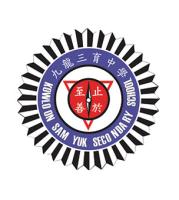| Language Policy |
Our aim is for our students to be biliterate and trilingual. In the junior form, they are divided into EMI and CMI classes according to our students' learning ability and English proficiency. For the students adopting Chinese as the MOI, we increase students' exposure to English by conducting extended learning activities in most subjects. We foster a whole school language rich environment in which students are learning English and Putonghua effectively. Extra English classes and bridging programs after school are provided to help students adapt to EMI. Supplementary Chinese classes after school are provided for students who need to raise their Chinese language proficiency. To strengthen the English team, we have employed three NET teachers. We also raise students' interest in reading by launching a school-based reading scheme and the publication of students' writings. In order to promote students' interest in learning English and Chinese, they are encouraged to participate in the School Speech Festival. |
| Learning and Teaching Strategies |
The school enjoys a nice campus environment. We have adopted a learner-centered teaching approach. In order to cater for learner diversity, the school has restructured the curriculum in English, Chinese and Mathematics. There are split classes in English and Chinese. We have held different projects with EDB to improve the teaching and learning quality of the school. Our teachers adopt the teaching strategies of "tiered instruction", preparing different kinds of activities for simulation on mindsets and providing rapid feedback with speedy adjustments and corrections. The school provides overseas and mainland study tours to enrich their learning experiences. A broad and balanced curriculum is also designed to promote all-round development of the students. |
| School-based curriculum |
1. Electives: 2X. Students can choose two elective subjects according to the abilities and interests.<br> 2. Curriculum highlights: Our school-based curriculum is developed to suit and meet the learning needs and abilities of students. We observe the student-centered principle and are dedicated to enhancing our students’ learning experience , expanding their knowledge as well as supporting our students to develop a right philosophy of life for themselves. To enhance the learning and teaching effectiveness, we have partnered with the EDB School-based Support Service to develop a high-quality English Language curriculum. To cater for the senior form students’ increasingly diverse interests, their needs for future studies and career development, a wide range of subjects are available for selection. A school-based gift education programme has been organised to inspire students, unleash their potential and to cater for their diversity. |
| Approach to Catering for Learner Diversity |
We invite experts to help teachers recognize the development of students and develop learner-centered teaching strategies to cater for learners' diversity. Teachers in the Discipline and Guidance Team work collaboratively with social workers and psychologists to give preventive and remedial support to students. Several teachers have received training on inclusive education. There are also English literacy and citizenship courses for newly arrived immigrants. |
| Approach to Integrated Education |
School has all long been promoting IE in accordance with basic principles, namely early identification, early intervention, whole School Approach and home-school cooperation. The Special Education Needs Coordination Team deploys resources flexibly so as to support quality teaching in regular classroom, "add on" intervention and intensive individualised support. |
| Education Support for Non-Chinese Speaking (NCS) Students |
|
| Home-School Co-operation |
Since founded in 1998, the Parent-Teacher Association enhances cooperation between the school and parents. Moreover, the Parent Resources Centre provides useful resources to parents. The school also offers Parent Talks and various recreational activities. Parents' groups are run biweekly. |
| School Ethos |
We adopt a holistic guidance approach in the pastoral care of students. With a dual form-teacher system in junior section, class teachers can pay attention to and take care of students’ personal growth in a more friendly and individual manner. Teachers make regular phone calls and meet parents to strengthen links with the family. Different career talks for students and parents are held during the school year catering for their needs. Together we create a loving and caring culture and a harmonious campus, which is recognized by the society and manifested by receiving Caring School Award for years. |
| School Development Plan |
1. To promote e-learning and more extensive use of online platforms to promote self-directed learning.<br><br>2. To maximise students’ use of English in class and around the campus, three NET teachers are employed to co-teach with local English teachers and to conduct speaking classes, along with other, language related activities for all classes, as well as interactive Reading lessons for all junior form students. An English-rich environment is created through sharing on assembly, the English Ambassador Programme, English Corner activities and musical productions, where students can use English in authentic contexts. Local and overseas English immersion programs are also organized during the long school holidays. |
| Teacher Professional Training and Development |
Among the 37 full-time teachers, 70% have completed teachers' training, and 49% hold a master degree. Our team, who are eager to learn and try out student-centered methodology, have enabled our school to become a learning organization. In recent staff-development days, experts were invited to share team building strategies and lesson analysis skills to improve teaching methodology. In addition, teacher visits to other schools have been undertaken to nurture inter-school cooperation. A series of effective measures such as peer-observation, collaborative lesson preparation and teacher assessments are implemented to improve teaching effectiveness. |
| Life-wide Learning |
The school has set up over 26 clubs and interest groups. These activities encompass five major areas: academic, social services, interests, fine arts and sport. Apart from these activities, multiple-intelligence enhancement courses are held to further enrich students' school life. |
